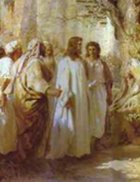The Shared Divine Essence of the Godhead

.... Okay, now how would Arius answer the Trinitarian concept? If he answered like a Jehovah Witness answered me once, he would say something like this:
.... "Well, Satan is referred to as ‘the god of this age’ in Scripture, so why don’t you put him in with your trinity?"
.... Well the Bible does say that there are ‘so-called’ gods and ‘so-called’ lords, and that’s the sort of category that Satan might fit into. And although their point was obviously blasphemous (no matter how you look at it), in strictly doctrinal terms their point is well taken. Why do we only include Father, Son and Holy Ghost as being members of the godhead, when there are other beings referred to as ‘gods’ in the Scriptures? Those so-called ‘gods’ so-called ‘goddesses’?
.... The reason we only include Father, Son and Holy Ghost is because they are shown to be one in essence with each other, and also because all of the purely divine attributes are equally ascribed to each personage.
.... First let’s take a look at the factor of essence. Jesus said very plainly that "I and the Father are one."(John 10:30) and in saying this, He means that He is one in essence with the Father, as can clearly be seen by the context (if you’ll look in verse 33). So the Father and the Son are set forth as being one in essence. Another good place to see this, in the Old Testament, is Isaiah 44:6, or in a prophecy from Zechariah that says:
.... "And I will pour on the house of David and on the inhabitants of Jerusalem the Spirit of grace and supplication; then they will look on Me whom they have pierced; they will mourn for Him as one mourns for his only son, and grieve for Him as one grieves for a firstborn."
(Zechariah 12:10)
.... So the Father and Son are shown to be one in essence. Next we see that the Father and the Spirit are one in essence. If you’ll look in Isaiah 48:16, you’ll see the entire Godhead mentioned in the Old Testament. And in referring to the Father and the Spirit, the passage says:
.... "And now the Lord GOD, and His Spirit have sent Me."
.... That Hebrew verb ‘have’ is actually a singular verb, literally meaning ‘has’: ‘The Lord God and His Spirit has sent Me.’ And this shows that the Father and the Spirit are one in essence. And finally if you’ll go to 2 Corinthians 3:16-17 the Scriptures say:
.... "Nevertheless when one turns to the Lord, the veil is taken away. Now the Lord is the Spirit; and where the Spirit of the Lord is, there is liberty."
(2 Corinthans 3:16-17)
.... The Spirit here is referred to as the Lord, and Jesus Christ is the Lord.. The Lord is the Spirit. In Galatians 4:4 the scriptures say God that has sent forth the Spirit of His Son into their hearts crying out "Abba, Father." Jesus Christ and the Holy Spirit are distinct in personalities, but they are only one in essence.
















0 Comments:
Post a Comment
<< Home